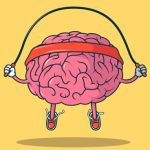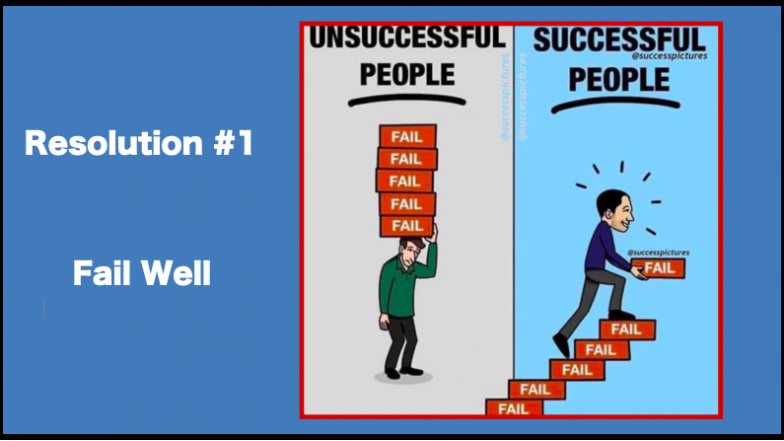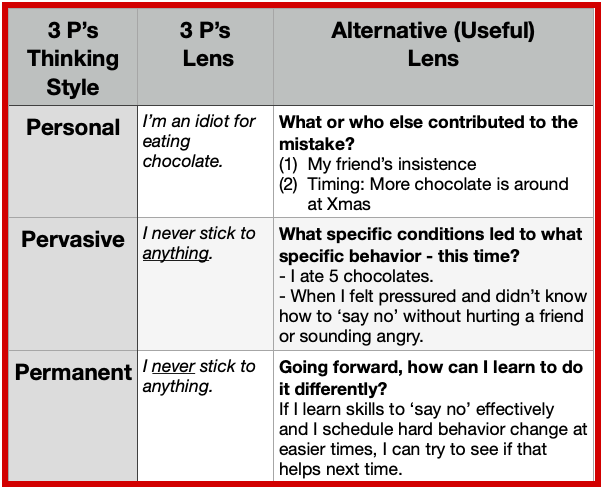Summary
Most of us fail at keeping resolutions, not to mention other goals. So, why not try a different approach?
Let’s learn how to be more skillful at … Being ready to fail … and … Doing it well … in order to have the life we most want!
OnAir Post: Fail Well
About
Overview
Life is full of setbacks (aka failures). We don’t stick to diets, exercise, or sleep regimens. We lose jobs, miss opportunities, rupture our relationships and repeat self-defeating behavior. So, this isn’t just about New Years … it’s about the rest of our lives.
Growing up among generations of depression, anxiety, suicides, divorces, alcoholism, and more, I certainly didn’t learn how to deal well with my own (plentiful) failures. Regardless of our early experiences, science has taught us ways that that we can learn how to fail well – to succeed more often.
So, here’s what I know that works – via science (CBT and positive psychology), backed up by the school of hard knocks. Let’s use a relatively universal example, just to illustrate a 5-Step process.
I want to lose weight. I set one tiny goal: Don’t eat chocolate this week. Of course, I end up eating a bunch of chocolate. Once I realize I broke my diet, I now think that the day is shot for ‘good behavior’ so I may as well eat whatever the hell I want and I do. Right afterwards, I’m really angry with myself but I vow I’ll start anew tomorrow. The next day I knowingly overeat, I’m fixated on my failures, and I’m overwhelmed with self-berating, guilt, shame, and demoralizing conclusions like, “I never stick to anything”. Bottom line, welcome to my well-worn diet rabbit hole.
1. Setbacks & Autopilot
Start with the premise that we all make mistakes (i.e., have setbacks) which often trigger a self-defeating default reaction – a bundle of negative thoughts, feelings, and behaviors (i.e., our Autopilot). We’re all hardwired to act in ways we regret. Since our setbacks and autopilots are fully expectable (predictable), we can intentionally build up skills to be ready for the next time and decide to react differently.
So now, next time you’re feeling stressed, expect Setbacks and Autopilot. Intentionally decide to watch your experiences – like an objective reporter calling it as you see it, moment by moment.
Mindfully, I notice and name the process … “Oh, here’s my diet rabbit hole.”
Mindfully, I dispassionately study it … “Now I notice that I’m feeling overwhelmed and struggling with all the negativity … Now I notice I’m having the thought … I’m an idiot for having that chocolate … Now I notice I’m having a feeling of anger – between a 5 and a 7 out of 10 … Now I notice the urge to eat more … Now I notice I’m reaching for a sweet … Now I notice I’m feeling guilty (an 8 out of 10) that I know I’m eating a sweet and still do it anyway …
2. The Growth Mindset
 Begin with the premise that when we’re more rational, we’d CHOOSE to take the science-based stance that reframes mistakes (setbacks) as challenges that we can overcome by studying the elements of the system to see what conditions trigger or maintain them. And, as long as we keep persisting, we can figure out work-arounds to most challenges.
Begin with the premise that when we’re more rational, we’d CHOOSE to take the science-based stance that reframes mistakes (setbacks) as challenges that we can overcome by studying the elements of the system to see what conditions trigger or maintain them. And, as long as we keep persisting, we can figure out work-arounds to most challenges.
Dr. Dweck suggests that if we practice choosing the Growth Mindset, we can learn to approach challenges with an attitude of curiosity, reminding ourselves of the power of YET. I may not have mastered this challenge … YET … but, I’ll get there if I keep asking questions about how it happened, problem-solve, and learn new ways.
Mindfully, I note … “This is a good opportunity to figure out what the conditions were that triggered the mistake this time. I did see one chain reaction (i.e., an interpersonal situation) right before I ate the first chocolate. My friend offered one to me … I told her I was really trying not to eat chocolate … Then, she insisted I just try one … I noticed that in that moment … I didn’t have the right words to say ‘no’ without sounding really frustrated with her … So, I ate.
I can set a new goal to try to reduce that trigger in the future … I’m not there YET … I need to learn a skill – how to say “no” more effectively – without hurting someone. This is an interesting challenge … I will find a Youtube video or a book that teaches me how to do it. If I keep at it, I can figure it out to become more skillful.”
3. The De-motivating 3 P’s
Dr. Seligman would suggest that we be ready to catch ourselves in Personal, Pervasive, and Permanent thoughts – the most demoralizing and demotivating style of thinking. According to his ‘learned optimism’ research, people who prompt themselves to reframe with alternative, more useful, thoughts actually perform much better.
4. The Motivating 3 W’s
To build confidence, pay MORE attention to the details of what you did to contribute to ‘What Went Well’ (3 W’s) this past week. It can strengthen the new neural pathways formed by your new behaviors to build habits. Schedule (20 minutes a week) savoring the 3 W’s. It usually is a positive experience.
Just fill in the blanks of … Yes … And … Jot it down in a journal. If it sounds too self-indulgent, you might think of it as notes for the book you’ll write to help others or even to leave to your children, so they can learn your wisdom.
YES … I fell back into Autopilot (ate 5 chocolates, etc)
AND … Then I chose to learn to do better … using
- Skills: Mindfulness to identify what I could change, (2) Reframing 3 P’s, (3) Practice Growth Mindset, (4) Problem-solving, (5) Goal setting to learn how to ‘say no’
- Strengths: Honesty, Open-Mindedness
- Supports: New book, Asserting Yourself
- Values: Living a healthy lifestyle, with self compassion (i.e., eat well, move more, stress less, love more)
- Beliefs: To err is human; to forgive [and learn to do better next time] divine; I can expect autopilot and then choose a Growth Mindset; I can expect the 3 P’s and reframe; Simple, not easy
5. Mantra: Simple, Not Easy
Don’t forget self-compassion! Many of us never even try to reach for our dreams. After all, it’s human nature to avoid the failure-related negative feelings – the fears, helplessness, hopelessness, guilt, shame and loss of esteem or confidence. That’s why AA has a mantra: Simple, not easy.
Yes, it’s simple to know:
(1) Normalize failure as an expectable, temporary setback
(2) Neutralize obstacles as inevitable bumps in the road to problem-solve
(3) Savor your new choices … to build confidence for the next bump in the road.
It was only after I explored what was MOST important to me (clarified the values I’m passionate about) – to discover how I wanted to be in the world (in work, play, love), that I became more ‘gritty’ – and felt empowered to persevere through the stressful times.
So, it’s OK to make (even big) mistakes. To err is human; to forgive (and learn to do better) divine. The more time we commit to the life we really want, expect setbacks, and keep learning to do better, the less time we’ll waste on blaming ourselves and others, procrastinating, getting stuck in a demoralized rabbit hole, or even avoiding our dreams altogether. Still …. simple, not easy!
Twenty years from now you will be more disappointed by the things that you didn’t do than by the ones you did do, so throw off the bowlines, sail away from safe harbor, catch the trade winds in your sails. Explore, dream, discover. Mark Twain
References
- Watch Stanford Professor Dr. Dweck explain the science of the Fixed v. Growth Mindset.
- Learn more about U Penn Professor Dr. Seligman’s “3 P’s and Learned Optimism” research.
- Learn more about UPenn Professor Dr. Duckworth’s Grit Lab.
- Watch demonstrations and explanations of the mindfulness skill.
- 7 most common autopilot reactions

